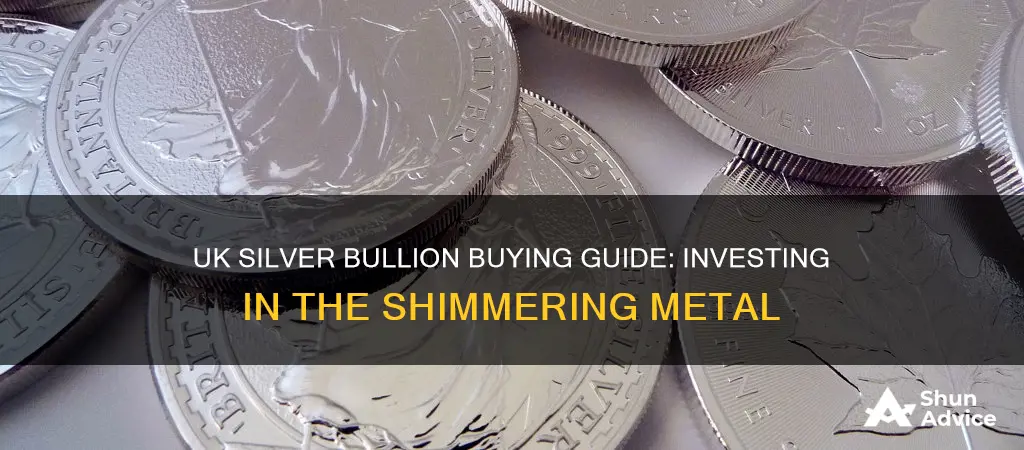
Silver is a popular precious metal for investors, and there are several ways to invest in it in the UK. You can buy physical silver bullion in the form of coins or bars, or you can invest in silver through derivatives such as ETFs or closed-end funds. When buying physical silver, you can purchase it from local dealers, pawn shops, or online dealers, and it can be stored at home or in a secure storage unit. Silver coins are often defined as legal tender and are backed by a specific government or central bank, making them more internationally recognisable than bars. Silver bars, on the other hand, tend to have lower premiums due to their lower manufacturing costs. It's important to note that silver coins and small bars incur VAT and shipping costs, as well as insurance costs if stored at home.
| Characteristics | Values |
|---|---|
| Silver investment type | Physical silver, silver bullion, silver coins, silver ETFs, silver mining stocks, silver futures |
| Silver bullion bars weight | 2.5 grams to 5 kg |
| Silver coins | Silver Britannias, Canadian Silver Maples, American Silver Eagles, Silver Chinese Pandas, Royal Mint Silver Lunar Series, Austrian Silver Philharmonic, Silver Queen's Beasts |
| Silver bullion bars refiners | PAMP, Umicore, Metalor, Scottsdale |
| Silver bullion bars purity | 999 fine silver |
| Silver coins refiners | The Royal Mint |
| Silver coins purity | 999 fine silver |
| Silver coins tax efficiency | Silver Britannias are exempt from capital gains tax in the UK |
| Silver ETFs | iShares Silver Trust (SLV), Aberdeen Standard Physical Silver Shares ETF (SIVR), ProShares Ultra Silver (AGQ) |
| Silver mining stocks | Global X Silver Miners ETF (SIL), iShares MSCI Global Silver Miners ETF (SLVP), ETFMG Prime Junior Silver Miners ETF (SILJ) |
What You'll Learn

Silver bars vs. coins
When it comes to investing in silver bullion in the UK, you have two main options: bars or coins. Here's a breakdown of the key differences between silver bars and coins to help you make an informed decision:
Silver Bars:
Silver bars are a popular choice for those looking to invest in bulk silver and are typically the most cost-effective way to buy silver bullion. Bars are generally cheaper to produce than coins and often carry a lower premium. This is because minting coins can be a more intricate process, and they often have additional design features and security measures. Bars are usually stamped with the weight, fineness, and manufacturer's logo, keeping production costs lower.
Silver bars are available in a wide range of sizes, from small 1-ounce bars to large 1kg or even 100-ounce bars. The larger the bar, the closer to the spot price per ounce you will pay, as the premium is typically lower. For example, a 100-ounce bar will have a lower premium per ounce than a 1-ounce bar. However, larger bars may be less liquid, as they are harder to sell in part, and you may need to sell your entire bar when the time comes.
Silver Coins:
Silver coins, on the other hand, often have a higher premium but offer additional benefits that bars do not. Coins are usually produced by government mints and carry a legal tender value, which can provide added assurance and potential tax advantages in some countries. The Royal Mint in the UK produces the popular Britannia bullion coin, which is recognized worldwide and highly liquid.
Coins often have limited mintages and unique designs, which can add to their collectability and potential for numismatic value. This means that, over time, the value of certain coins can increase beyond their silver content due to their rarity and demand. Coins are also easier to trade in smaller quantities, making them more divisible and liquid than larger silver bars.
While both options are viable ways to invest in silver, it's important to consider your personal preferences, budget, and investment goals. Bars may be preferable for those seeking the lowest premium and wanting to buy in bulk, while coins offer additional security, recognition, and potential for numismatic value. It's always recommended to do your own research, compare prices and premiums, and choose reputable dealers when purchasing silver bullion.
Retirement Investments: A Secure Future or a Money Pit?
You may want to see also

Buying from dealers
When buying silver bullion from a dealer, you can choose to buy physical silver in the form of coins or bars, or you can invest in derivatives such as silver ETFs.
The benefit of buying physical silver is that you have true ownership of a tangible asset that you can physically touch and control. Silver bars are typically available at lower premiums than coins due to their lower manufacturing costs, making them a more cost-efficient investment. However, silver coins issued by governments, mints, and central banks often have legal tender status, making them more easily recognisable and verifiable. Certain silver coins, such as Silver Britannias, are also exempt from capital gains tax in the UK, making them a tax-efficient investment for UK investors.
On the other hand, silver ETFs (Exchange-Traded Funds) allow you to benefit from fluctuations in the silver price without owning any physical silver. ETFs are more convenient and usually cheaper than investing in physical bullion, but they don't offer the same benefits in terms of having a tangible asset that maintains its value.
When buying from a dealer, it's important to be aware of the "spread", which is the difference between the buying and selling price. This spread can be large and hidden, especially in retail markets, and can result in a significant loss of value for retail customers. Additionally, physical silver purchases from dealers may be subject to VAT or sales tax, which can increase the overall cost of your investment.
Rent or Invest: The Great Property Dilemma
You may want to see also

Silver futures
How Silver Futures Contracts Work
Examples of Parties Who May Use Silver Futures to Speculate
Buyers enter into contracts because they believe the silver price will rise above the current estimate on a given date. Sellers enter into these contracts, expecting the price of silver to be lower by the time the contract expires, allowing them to secure a profit.
Examples of Parties Who May Use Silver Futures to Hedge Risk
Buyers who use silver in manufacturing, such as electronics companies, may use silver futures to secure the price of silver and mitigate the risk of raw material costs spiralling. A silver mining company may also use silver futures to moderate the risk of falling silver prices, which can severely impact margins. Silver investors can use silver futures contracts to hedge against price fluctuations, reducing the volatility and risk of investing in silver.
The Cost of a Silver Futures Contract
The cheapest way to buy physical silver is on the current spot market. The cost of buying silver through a futures contract comes at a premium, typically 1% to 5% of the total contract value. This premium should be factored into calculations when considering silver futures.
Advantages of Silver Futures Trading
Risks Associated with Silver Futures
Factors Affecting Silver Futures Prices
Supply and demand dynamics play a crucial role in determining silver futures prices. On the supply side, factors like mining output, recycling rates, and government policies impact silver availability. Meanwhile, industrial usage, jewellery fabrication, and investment demand can influence demand. Economic indicators, such as inflation and interest rates, and geopolitical events also affect silver futures prices, as they can disrupt supply chains and impact investor sentiment.
US Risks Falling Behind in AI Race: Time to Invest and Innovate
You may want to see also

Silver ETFs
There are a few different types of silver ETFs:
Physically-backed silver ETFs
The majority of silver ETFs trading on the UK stock exchange are 'physically-backed'. This means that they buy silver and store it in a vault to support the price. If you buy a share of the fund, then you theoretically own a little piece of that silver. Examples of physically-backed silver ETFs include:
- IShares Physical Silver ETC (SSLN)
- WisdomTree Physical Silver (PHSP)
- Invesco Physical Silver (SLVP)
Silver mining company ETFs
There are also a number of popular ETFs that track the performance of a basket of silver mining companies. While the performance of these shares is influenced by the silver price, they will not track it exactly. Other factors such as labour costs, the political situation in the main silver mining regions, and the success of the companies themselves will make a difference.
Exchange-Traded Commodities (ETCs)
An Exchange-Traded Commodity (ETC) is an investment traded on a stock exchange, just like a share. Silver ETCs follow the price of silver either directly (by holding silver bullion) or by tracking an index of derivatives. ETCs can be an easy way for investors to gain exposure to commodities (such as silver) or more esoteric investments that would otherwise be inaccessible.
The cheapest silver ETC on the London Stock Exchange is the Source Physical Silver ETC (SSLV) with management charges of 0.39%. The most popular with Hargreaves Lansdown clients is the ETFS Physical Silver (PHAG), the largest silver ETC in the UK with a management charge of 0.49%.
Planning for Tomorrow: Strategies for Late-Start Retirement Investing
You may want to see also

Silver mining stocks
- Fresnillo: The world's largest silver producer from ore and Mexico's second-largest gold miner. It operates seven mines and has one of the largest precious metals land reserves in Mexico.
- Pan American Silver: One of Canada's most diversified mining companies, producing and selling silver, gold, lead, zinc, and copper. It owns and operates mines in Canada, Mexico, Peru, Bolivia, Argentina, and Guatemala.
- Hecla Mining: The largest silver producer in the United States and one of the oldest precious metals mining companies listed on the New York Stock Exchange.
- First Majestic Silver: A pure silver play, operating three silver mines in Mexico.
- Hochschild Mining: A British-based operator of four underground mines in Peru and Argentina. It has over 50 years of experience in precious metals mining.
- Fortuna Silver Mines: A Canadian-based silver miner that operates two mines in Peru and Mexico.
- Polymetal International: An Anglo-Russian precious metals mining company listed on the London Stock Exchange. It has paid out more than $1.8 billion in dividends since its IPO in 2011.
- Endeavour Silver: A mid-tier precious metals miner operating three high-grade silver and gold mines in Mexico, as well as other mines in Chile.
- Wheaton Precious Metals: A Canadian-based precious metal streaming company listed on the Toronto Stock Exchange, New York Stock Exchange, and London Stock Exchange. It purchases by-product precious metals from different mines worldwide.
- Newmont: The largest gold mining company in the world, also producing significant volumes of silver. It has mines in the US, Australia, Mexico, Argentina, Peru, and other regions.
It's important to conduct thorough research and analysis before investing in any stock. Silver stocks can be volatile due to their correlation with the underlying price of silver.
Smart Places to Invest $1 Million
You may want to see also
Frequently asked questions
Silver is the second most popular precious metal to invest in. It is a good investment option due to its ability to defy inflation or economic crisis. Silver can hold its value and even appreciate over time, providing a way for investors to generate profits. It is also a liquid market, making it easy to buy and sell.
You can buy silver bullion in the UK through online dealers such as BullionByPost, APMEX, or JM Bullion, or through authorised distributors for The Royal Mint. You can also purchase it from local dealers and pawn shops.
There are a few different types of silver bullion you can buy, including physical bars, coins, and exchange-traded funds (ETFs). Physical bars are usually available at lower premiums than coins and are therefore a more cost-efficient investment. Silver coins, on the other hand, are often recognised internationally and backed by a specific government or central bank, making them more liquid. ETFs allow you to benefit from fluctuations in the silver price without owning any physical silver.
When buying silver bullion in the UK, you may incur costs such as VAT, shipping, insurance, and storage fees. Silver bullion stored in a London Bullion Market Association (LBMA)-approved vault is exempt from VAT. However, if you choose to store your silver bullion at home or in a private storage facility, you will need to pay VAT, which is currently 20% in the UK, as well as shipping and insurance costs.
One of the risks of investing in silver bullion is the potential for overpaying. It is important to be aware of the spot price to ensure you are getting a fair deal. Additionally, if you need to sell your silver quickly, you may not be able to retrieve the full value, especially if you go through a dealer. Silver is also subject to theft, so you will need to safeguard and insure it appropriately.







